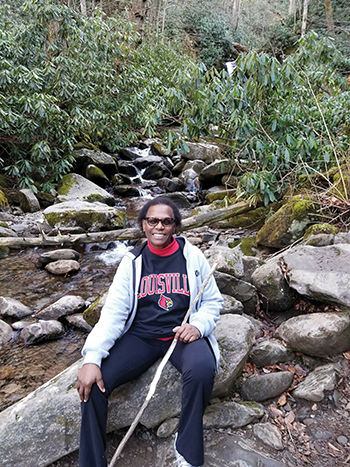HER2+ Breast Cancer Survivor
A lot of research and support helped this survivor never give up

When Connie Stafford received a Stage II triple positive breast cancer diagnosis at 60, she was grateful for the love and support provided by her friends and family. Notorious for taking copious amounts of notes, she dedicated herself to being informed and asked lots of questions. Today, she is cancer-free and loving life.
From the start, I focused on my desire to learn, the encouragement of family and friends, an amazing medical team and faith in God to get me through cancer. As soon as I found out I had Stage II ER+, PR+, HER2+ breast cancer, I called my family from the doctor’s office. They, in turn, contacted more family and friends. By the time I arrived home, 20 to 30 people were waiting for me. They laid their hands on me and prayed over me. I knew then I was never going to be alone.
My family made sure that I never went to an appointment or treatment without someone with me. It was helpful to have someone to help me remember what the doctors said.
I carried a notebook with me to every appointment, took a lot of notes and always had a list of questions ready for the doctors. During a visit for a second opinion, the doctor asked me if I would put down the notebook so he could do a physical exam. I agreed, but picked it right back up once he was finished.
As a goal-oriented person, I made sure I understood everything the doctors said. I researched my type of breast cancer and spoke with many specialists to gather the most information to help me make the best decisions for me. I told them to tell me everything!
After doing my research and talking with my oncologist, breast surgeon, plastic surgeon and radiologist, the consensus was that I should have chemotherapy as well as drug therapy specifically for HER2+ patients, followed by surgery to remove the tumor and reduce the size of my breast, which in turn, would reduce the area that needed radiation therapy. About a month after I was diagnosed, I had a port put in and started the drug therapies. At the time, I was an early childhood resource teacher, and I was determined to finish my 29-year career. I scheduled chemotherapy on Thursdays, stayed home Fridays and returned to work Mondays. Every three weeks I would additionally receive the HER2+ drug therapy along with the chemotherapy. Luckily, my employer was flexible with me.
Once chemotherapy made my hair fall out, my nephew shaved it all off for me. I took advantage of the hospital’s free wig program but soon realized I hated wearing wigs. Once my chemotherapy was finished, I removed the wig, put on makeup, eyelashes and some jewelry and walked back into work bald. I was worried my students and other teachers would think I was a man without my hair, but they didn’t and I was very relieved. Over time, my hair grew back.
Follow-up scans four months later showed the tumor was gone. The surgeon moved forward with removing any tissue the tumor may have touched and performed the breast reduction surgery. I then began radiation therapy.
Before my diagnosis, I was a very healthy person. I enjoyed line dancing every Tuesday night, walked regularly and watched my weight. Being healthy got me through treatment. However, the steroids I took along with the chemotherapy made me ravenously hungry. At first, I ate what I wanted, but once I started gaining weight, I backed off. Then when I felt hungry, I’d stir fry a bunch of vegetables instead of reaching for a milkshake. I only gained 15 pounds and lost most of it after treatment ended.
Learning I had cancer devastated me. At first, I was shattered and angry. I had been so careful about leading a healthy lifestyle that I felt a bit betrayed by my body for getting cancer. That’s where leaning on my family, my church and my faith in God helped. When I felt down, I took advantage of the many supportive services my cancer center offered, including a free massage every month, lectures, educational materials, where to find free wigs, and so much more. If you don’t know if your cancer center offers these services, be sure to ask. They were incredibly helpful.
After my surgery, I remained on the HER2+ medication for a year until my treatment was finished and I was considered cancer-free. Then for five years, I took a different medication to prevent a recurrence.
My doctor also recommended I get genetic testing. Although cancer did not run in my family, I decided to have it done. No mutations were found. Certain factors indicated an increased risk but nothing definitive. Ten years later, they repeated the testing because technology had improved and they wanted to see if they could learn anything new. But nothing new was found.
If you are facing a breast cancer diagnosis, I recommend getting different opinions, not just one. Believe in prayer, and trust in God. Push yourself. You may not be able to do as much if you’re on chemotherapy because it can slow you down, but don’t give up on yourself or your treatment. Stay as positive as you can, and never quit.


